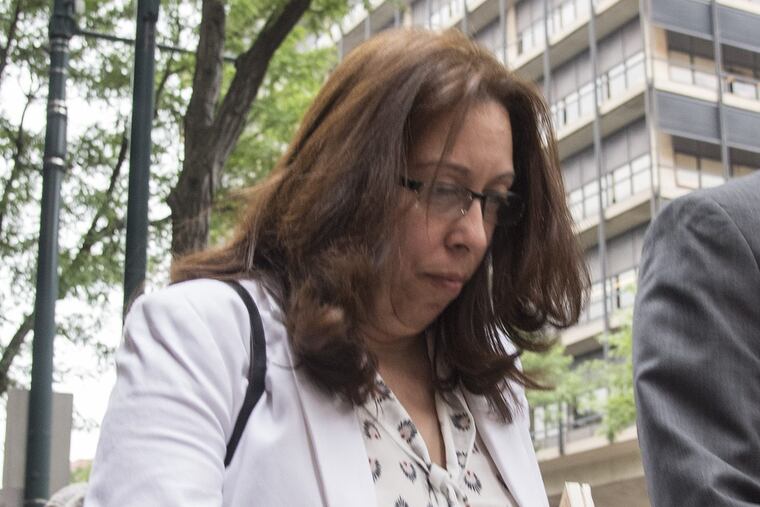Ex-State Rep. Leslie Acosta sentenced to 7 months in career-ending case
Former state Rep. Leslie Acosta was sentenced to seven months in federal prison Thursday for her role in a money-laundering scheme that abruptly ended her political career.

Former State Rep. Leslie Acosta was sentenced Thursday to seven months in federal prison for her role in a money-laundering scheme that abruptly ended her political career.
Forced to resign in 2016 after her House colleagues discovered she had run for reelection and won despite secretly pleading guilty to a felony crime that year, Acosta until then had dug in her heels and insisted she could remain in her post despite state constitutional provisions barring felons from holding elected office.
She struck a more conciliatory tone, however, in court Thursday, as she pleaded with U.S. District Judge Joel Slomsky to spare her from time behind bars.
"I know what I did was wrong, and it was a horrible mistake that I cannot take back," she said. "To make amends, I've done everything I can to become a better person."
Several former constituents testified about Acosta's continued efforts — even after being booted from office — to reshape the poverty-stricken North Philadelphia district she used to represent, which one likened to the bombed-out streets of Iraq.
"She has the ability to bring people together to talk about our issues," said another, Wanda Novales. "I had not seen that from other leaders."
As part of those efforts, Acosta, 46, told the judge she was set to begin a new job next week as general manager of a fledgling community TV and radio station that she hoped would provide new opportunities for local youths in media.
But by the time she left the courthouse with an order to report to prison in 45 days, she was hiding from awaiting photographers. One supporter put a hand over a young photographer's camera lens, then threatened to press assault charges when she tried to move it.
In the end, though, it was Acosta's extensive cooperation with federal investigators pursuing a case against another prominent Philadelphia political figure, Renee Tartaglione, that earned her a break from the judge.
Tartaglione was convicted last year of stealing more than $2 million from a publicly funded mental health clinic she ran in Fairhill, and Slomsky cited Acosta's testimony in that case in his decision to impose a sentence far lower than the three years she otherwise might have faced.
Still, he said, some jail time was necessary.
"This is a very serious offense in my eyes," Slomsky said. "We're dealing with public dollars that were misused by Ms. Acosta — money that could have been used for much better purposes, perhaps for hiring more therapists to assist the community."
Acosta, who briefly worked at Tartaglione's clinic before her first run for office in 2014, admitted on the witness stand last year that she had helped her one-time boss fleece thousands between 2008 and 2012 from the publicly funded Juniata Community Mental Health Clinic, a facility serving clients in one of the lowest-income neighborhoods in the city.
In all, Tartaglione — daughter of Philly's longtime elections chief, Marge Tartaglione; sister of State Sen. Christine M. Tartaglione; and wife of North Philadelphia ward leader Carlos Matos — embezzled more than $2 million by charging excessive rents and pocketing money in other schemes.
Acosta told jurors last year that she accepted numerous checks from the clinic for work she did not perform and kicked the money back to her former boss.
But she insisted at the time that she only had participated at the behest of her mother, Sandy Acosta, who worked as Juniata's operations manager, and had never personally benefited from the theft.
Since then, Acosta has paid a considerable cost, her lawyer Christopher Warren said in court Thursday. In addition to losing her elected post, she now lives in fear of being publicly known as someone who cooperated with authorities.
"She lives in a section of Philadelphia where cooperating witnesses are viewed with extreme disfavor," he said.
As a result, Thursday's sentencing took place under a shroud of secrecy — much like the hearing at which Acosta pleaded guilty in 2016.
Although it occurred in open court, details of the date and location were not placed on the public court docket prior to the proceeding. Filings between prosecutors and Acosta's defense lawyer in advance of the sentencing all occurred under court seal.
In the past, Acosta, her mother, and others had expressed concerns for their safety and said they feared retaliation from Tartaglione's husband, Matos — concerns at which Matos has scoffed.
But Assistant U.S. Attorney Bea Witzleben granted some deference to their fears in court.
"I'll try not to besmirch anyone's reputation," she said. "But Mr. Matos is certainly not a person who is shy or retiring or considered no risk to anyone."
Tartaglione and Sandy Acosta are scheduled to be sentenced next month.
In addition to her prison term, Leslie Acosta was ordered Thursday to pay more than $620,000 in restitution into a fund that will be distributed to a charity similar to the one she defrauded.
Staff photographer Heather Khalifa contributed to this article.